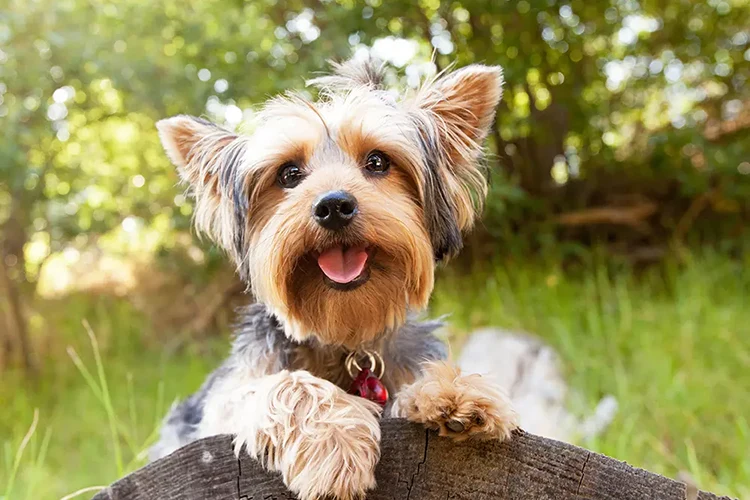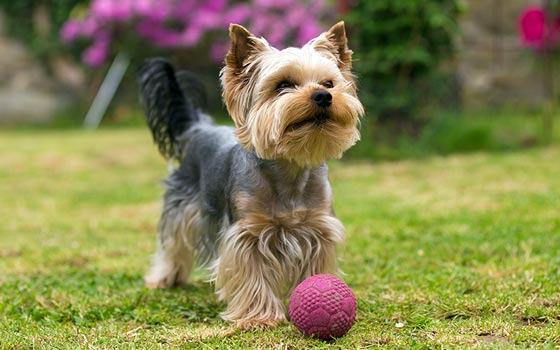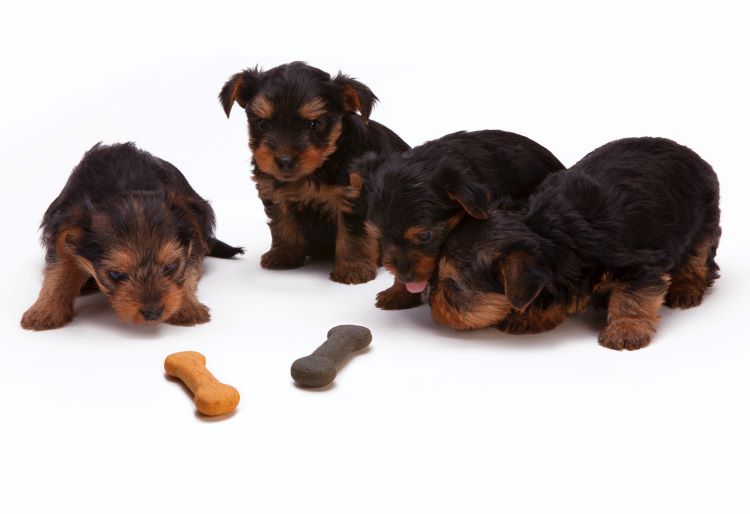Ready to help treat your pet to a healthy life?
All About the Yorkshire Terrier
By : Trupanion Staff | Updated Feb 16, 2024

The Yorkshire Terrier, often affectionately referred to as the "Yorkie," stands as a beloved symbol of elegance and charm in the world of small dog breeds. Originating from the northern counties of England (particularly Yorkshire), these pint-sized companions boast a rich history that intertwines both royalty and working-class roots. Despite their small stature, Yorkshire Terriers possess an undeniable presence, characterized by their silky, flowing coats and confident demeanor. Renowned for their intelligence and spunky personality, Yorkies make delightful companions for households of all sizes. Whether strutting along city streets or lounging in the comfort of their homes, Yorkshire Terriers captivate hearts with their loyalty, affection, and undeniable charisma.
Ready to learn more about the Yorkie and everything that makes them great? Let's dive in with this Yorkshire Terrier breed guide!
5 Fun facts about Yorkies
- Before becoming popular with Victorian ladies, the Yorkie was a working-class favorite for hunting rats and other vermin in factories and coal mines.
- The Yorkshire Terrier has a coat similar to human hair which only sheds small amounts during bathing or brushing, making them a great choice for people with allergies to fur. However, dog dander and saliva are a common trigger for allergy-sufferers, so a Yorkie might still trigger some sneezing or a stuffy nose.
- A Yorkshire Terrier named Lucy received the Guinness World Record for the world's smallest working dog. She worked as a therapy dog and weighed just 2 ½ lbs.
- A 4-lb. Yorkshire Terrier named Smoky was a war hero during World War II and even acted as a therapy dog for wounded soldiers recovering in military hospitals in the South Pacific. In 2005, a memorial was erected over her burial site in Ohio, with a sculpture of Smoky sitting atop a GI helmet. The dedication reads “Smoky, the Yorkie Doodle Dandy, and the Dog of All Wars.”
- Yorkies live for an average of 11 to 16 years, though some have been recorded as reaching their mid-20s!
History of the Yorkshire Terrier
Yorkies were originally developed during the mid-1800s in the county of Yorkshire in Northern England after Scottish weavers brought along their own Scottish terriers to live with them and work as ratters in their shops and factories. The breeds used in creating the Yorkshire Terrier aren’t known for sure, but it’s suspected that the Maltese was added to the mix to make the breed smaller, along with the Paisley Terrier (also known as the Clydesdale Terrier), a now-extinct Scottish breed, that gave the Yorkshire its long, lustrous coat. Shown along with other terrier breeds, the Yorkshire Terrier was recognized as a separate breed by the Kennel Club in 1886. This recognition helped the Yorkie transition from a working-class breed to a lapdog favorite of Victorian ladies, which contributed to the smaller size of the breed we see today.
As Americans embraced the Victorian ways of England, the Yorkshire Terrier made its way across the Atlantic, arriving in the United States in the early 1870s. The American Kennel Club recognized the Yorkshire Terrier in 1885, and the breed remained popular until the 1940s when small dogs fell out of favor for a while in the United States. The Yorkie has made a comeback over the last few decades, thanks to their wonderful plucky temperament, small size, lifelong puppy-like looks, and being carried as arm candy by the glitterati. They consistently rank in the top 10 most popular breeds in the United States.

Breed details
Yorkshire Terriers are a tiny breed, but they are full of personality. They have a gorgeous and silky coat when left to grow long, and they can rock a poofy topknot.
Behavior & Training
Yorkshire Terriers were originally used as ratters, which required tenacity, high prey drive, and the ability to work independently. These aspects of the breed are still seen in modern-day Yorkshire Terriers. They make wonderful watchdogs and revel in their role as a cuddle buddy.
Temperament
A Yorkshire Terrier might not understand quite how small they actually are — they are terriers after all! Full of vigor and with a feisty personality, this breed loves a challenge and is quite intelligent. Often subdued when meeting new people, Yorkies bond closely with their humans and are affectionate and cuddly with those they trust, if not a bit demanding of their attention.
Dog breeds similar to the Yorkie
- Silky Terrier
- Maltese
- Australian Terrier
- Biewer Terrier
- Norfolk Terrier
Do Yorkies get along with others?
- Yorkshire Terriers need proper proactive exposure to new sights, sounds, people, dogs, and other animals as a young puppy. Because they bond closely to one person (or a few family members), they tend to be protective and territorial when strangers approach. Their small size also makes many things in the environment overwhelming or scary, so early socialization during puppyhood is imperative for a well-adjusted dog.
- A Yorkie’s small size makes living with children difficult, as they can easily be injured with any rough handling and tend to get revved up with lots of noise and movement. However, they can do well with older children if they are socialized with them as puppies from a young age and the children are respectful in their handling. Young children and dogs should always be supervised, and it’s helpful for a dog to have their own “safe space” where they can go when they need some quiet time.
- Yorkies do best as an only dog in the home. However, if properly introduced and socialized from a young age, they can live with other animals successfully.
Exercise requirements
Yorkies are full of energy, and even though they’re small they can go-go-go! A couple of daily walks along with time for games help Yorkies stay in shape and burn off that terrier energy. Yorkies are known for their love of toys, so investing in some great size-appropriate fetch toys and stuffies will make playtime fun for both dog and human.
Their small size means they shouldn’t be jumping from heights such as furniture or out of the car, as it’s easy for them to injure themselves. Yorkies can even be seriously injured in jumps or a fall from their owner’s arms. They’ll appreciate easier access to their favorite couch nesting spots with a ramp or dog stairs, and they should be lifted in and out of cars and on and off furniture.
Mental enrichment needs
Yorkshire Terriers are quick-witted and love having a challenge to solve. Keep their brain engaged and sharp by joining training classes, dog sports, and providing lots of mental enrichment activities at home. Yorkies love food puzzles and interactive toys and excel in trick training!
Common behavioral issues
Yorkies can be quite demanding, and often this is encouraged by human behavior. Because they are so small and absolutely adorable, many owners don’t invest the time in training and Yorkies learn that barking or other demanding behaviors get them what they want. Simply investing some time in positive reinforcement training and providing enough physical and mental exercise will help Yorkies learn polite manners and prevent unwanted behaviors.
Yorkshire Terriers, like many other toy breed puppies, might have issues with housebreaking and take longer than other breeds to become fully housetrained. Consistency throughout puppyhood, frequent potty breaks, and patience will help them be successful and prevent house soiling.
Ideal activities for Yorkies
Yorkshire Terriers enjoy and excel in quite a few activities:
- Agility
- Earth Dog/Barn Hunt
- Canine Freestyle
- Tracking
- Rally Obedience
- Trick Training
- Hearing Service Dog
Grooming and care
The Yorkshire Terrier has a smooth and silky single-layer coat. Similar to human hair, when left uncut it can grow up to two feet long!
Yorkies require daily brushing and regular grooming to keep their coat in tip-top shape, especially if kept long. Many Yorkie owners have a professional groomer clip the coat short for easier maintenance. Introduce your Yorkie puppy to grooming early to make their experiences positive and stress-free for everyone.
Best brush for a Yorkshire Terrier: Boar bristle brush, Slicker brush
Common health conditions in Yorkshire Terriers
Every Yorkie is unique, but their DNA does mean they may be at more risk for certain illnesses or other health conditions than other dog breeds. But don't worry! Understanding the types of health conditions your Yorkshire Terrier may be at great risk for can help you be a more prepared pet owner.
- Diabetes
- Brachycephalic conditions, such as tracheal collapse
- Heart defects, such as patent ductus arteriosus
- Liver shunts
- Luxating patellas
Always consult with your veterinarian if you are concerned about your dog's health. In the meantime, you can help protect your dog from unforeseen health conditions by signing up for a quality pet insurance plan.

Yorkies in pop culture
With its friendly nature and memorable appearance, Yorkies have been popular in a wide range of media and as the pets of celebrities.
Famous owners of the Yorkie
- Missy Elliott (Rapper/Producer)
- Emmy Rossum (Actress)
- Audrey Hepburn (Actress)
- Joan Rivers (Comedian)
- Stevie Nicks (Singer)
- Natalie Portman (Actress)
- Britney Spears (Singer)
- Steven Tyler (Singer)
- Jay Mohr (Actor)
Yorkies in art and media
- Toto, while played by a Cairn terrier in The Wizard of Oz, was supposedly illustrated as a Yorkie by W.W. Denslow.
- Yorkie lovers may want to skip out on watching A Fish Called Wanda. There are three Yorkies featured in this movie, and none of them end up with pleasant fates.
- Moses in Meet the Fockers.
- Mignon on Green Acres.
- Doogie, Whitney Houston’s Yorkie, was featured with her on the reality show Being Bobby Brown.
- Audrey Hepburn’s dog, Mr. Famous, starred alongside her and Fred Astaire in the movie Funny Face.
